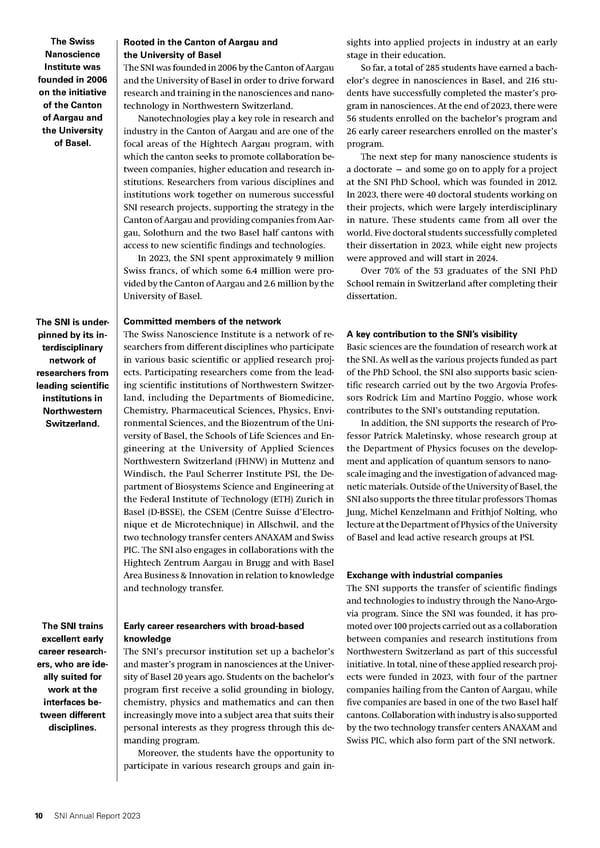The Swiss Rooted in the Canton of Aargau and sights into applied projects in industry at an early Nanoscience the University of Basel stage in their education. Institute was The SNI was founded in 2006 by the Canton of Aargau So far, a total of 285 students have earned a bach- founded in 2006 and the University of Basel in order to drive forward elor’s degree in nanosciences in Basel, and 216 stu- on the initiative research and training in the nanosciences and nano- dents have successfully completed the master’s pro- of the Canton technology in Northwestern Switzerland. gram in nanosciences. At the end of 2023, there were of Aargau and Nanotechnologies play a key role in research and 56 students enrolled on the bachelor’s program and the University industry in the Canton of Aargau and are one of the 26 early career researchers enrolled on the master’s of Basel. focal areas of the Hightech Aargau program, with program. which the canton seeks to promote collaboration be- The next step for many nanoscience students is tween companies, higher education and research in- a doctorate — and some go on to apply for a project stitutions. Researchers from various disciplines and at the SNI PhD School, which was founded in 2012. institutions work together on numerous successful In 2023, there were 40 doctoral students working on SNI research projects, supporting the strategy in the their projects, which were largely interdisciplinary Canton of Aargau and providing companies from Aar- in nature. These students came from all over the gau, Solothurn and the two Basel half cantons with world. Five doctoral students successfully completed access to new scienti昀椀c 昀椀ndings and technologies. their dissertation in 2023, while eight new projects In 2023, the SNI spent approximately 9 million were approved and will start in 2024. Swiss francs, of which some 6.4 million were pro- Over 70% of the 53 graduates of the SNI PhD vided by the Canton of Aargau and 2.6 million by the School remain in Switzerland after completing their University of Basel. dissertation. The SNI is under- Committed members of the network pinned by its in- The Swiss Nanoscience Institute is a network of re- A key contribution to the SNI’s visibility terdisciplinary searchers from di昀昀erent disciplines who participate Basic sciences are the foundation of research work at network of in various basic scienti昀椀c or applied research proj- the SNI. As well as the various projects funded as part researchers from ects. Participating researchers come from the lead- of the PhD School, the SNI also supports basic scien- leading scienti昀椀c ing scienti昀椀c institutions of Northwestern Switzer- ti昀椀c research carried out by the two Argovia Profes- institutions in land, including the Departments of Biomedicine, sors Rodrick Lim and Martino Poggio, whose work Northwestern Chemistry, Pharmaceutical Sciences, Physics, Envi- contributes to the SNI’s outstanding reputation. Switzerland. ronmental Sciences, and the Biozentrum of the Uni- In addition, the SNI supports the research of Pro- versity of Basel, the Schools of Life Sciences and En- fessor Patrick Maletinsky, whose research group at gineering at the University of Applied Sciences the Department of Physics focuses on the develop- Northwestern Switzerland (FHNW) in Muttenz and ment and application of quantum sensors to nano- Windisch, the Paul Scherrer Institute PSI, the De- scale imaging and the investigation of advanced mag- partment of Biosystems Science and Engineering at netic materials. Outside of the University of Basel, the the Federal Institute of Technology (ETH) Zurich in SNI also supports the three titular professors Thomas Basel (D-BSSE), the CSEM (Centre Suisse d’Electro- Jung, Michel Kenzelmann and Frithjof Nolting, who nique et de Microtechnique) in Allschwil, and the lecture at the Department of Physics of the University two technology transfer centers ANAXAM and Swiss of Basel and lead active research groups at PSI. PIC. The SNI also engages in collaborations with the Hightech Zentrum Aargau in Brugg and with Basel Area Business & Innovation in relation to knowledge Exchange with industrial companies and technology transfer. The SNI supports the transfer of scienti昀椀c 昀椀ndings and technologies to industry through the Nano-Argo- via program. Since the SNI was founded, it has pro- The SNI trains Early career researchers with broad-based moted over 100 projects carried out as a collaboration excellent early knowledge between companies and research institutions from career research- The SNI’s precursor institution set up a bachelor’s Northwestern Switzerland as part of this successful ers, who are ide- and master’s program in nanosciences at the Univer- initiative. In total, nine of these applied research proj- ally suited for sity of Basel 20 years ago. Students on the bachelor’s ects were funded in 2023, with four of the partner work at the program 昀椀rst receive a solid grounding in biology, companies hailing from the Canton of Aargau, while interfaces be- chemistry, physics and mathematics and can then 昀椀ve companies are based in one of the two Basel half tween different increasingly move into a subject area that suits their cantons. Collaboration with industry is also supported disciplines. personal interests as they progress through this de- by the two technology transfer centers ANAXAM and manding program. Swiss PIC, which also form part of the SNI network. Moreover, the students have the opportunity to participate in various research groups and gain in- 10 SNI Annual Report 2023
 Annual Report 2023 Page 9 Page 11
Annual Report 2023 Page 9 Page 11